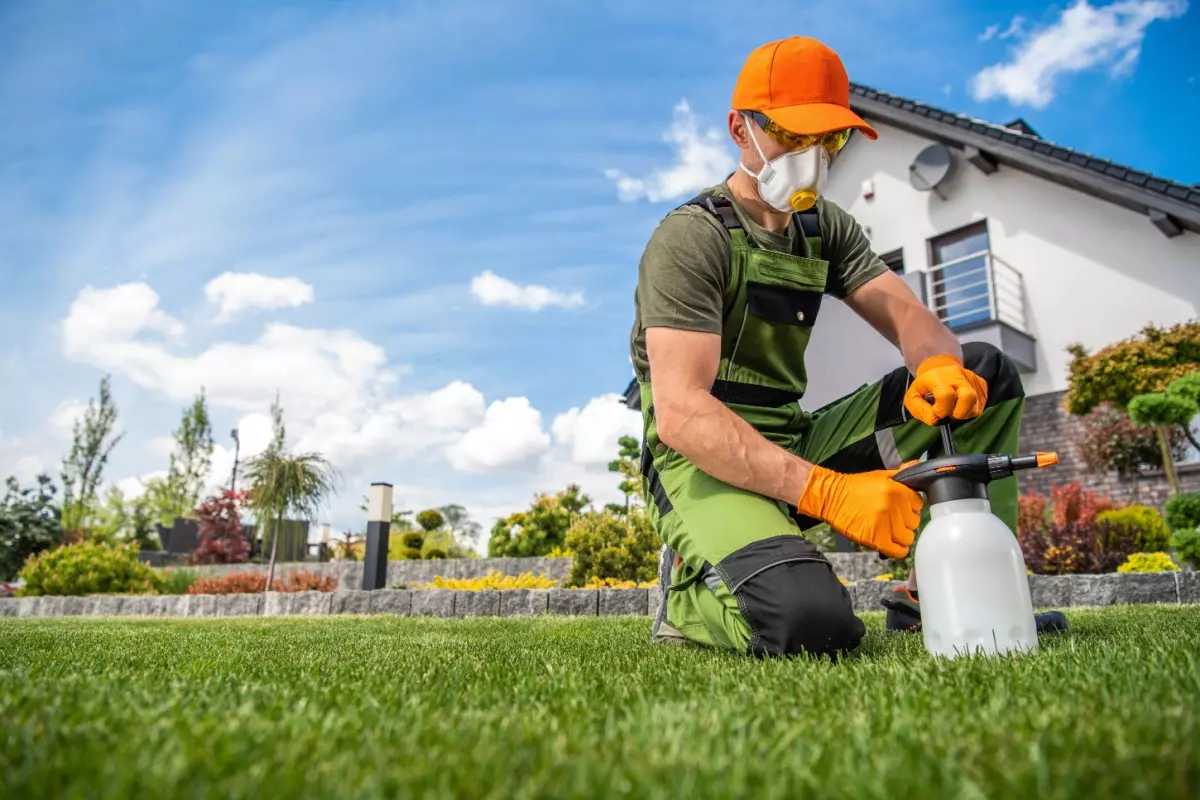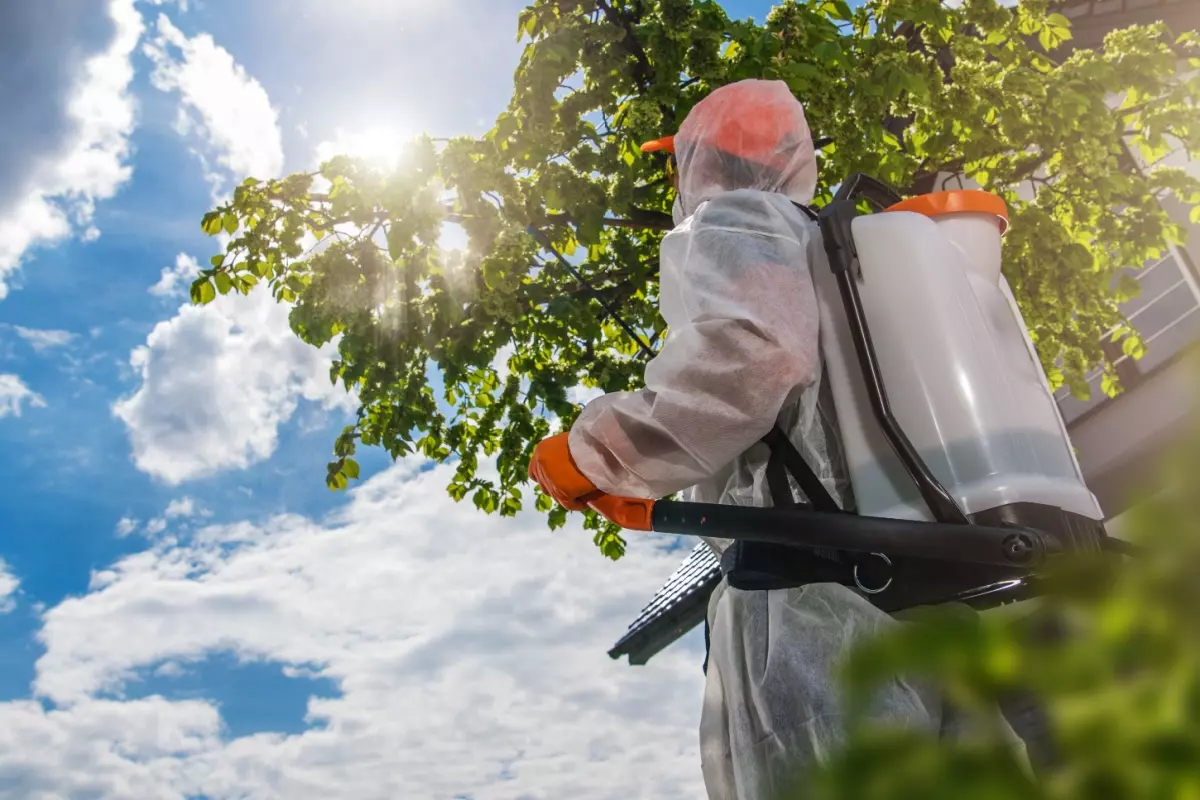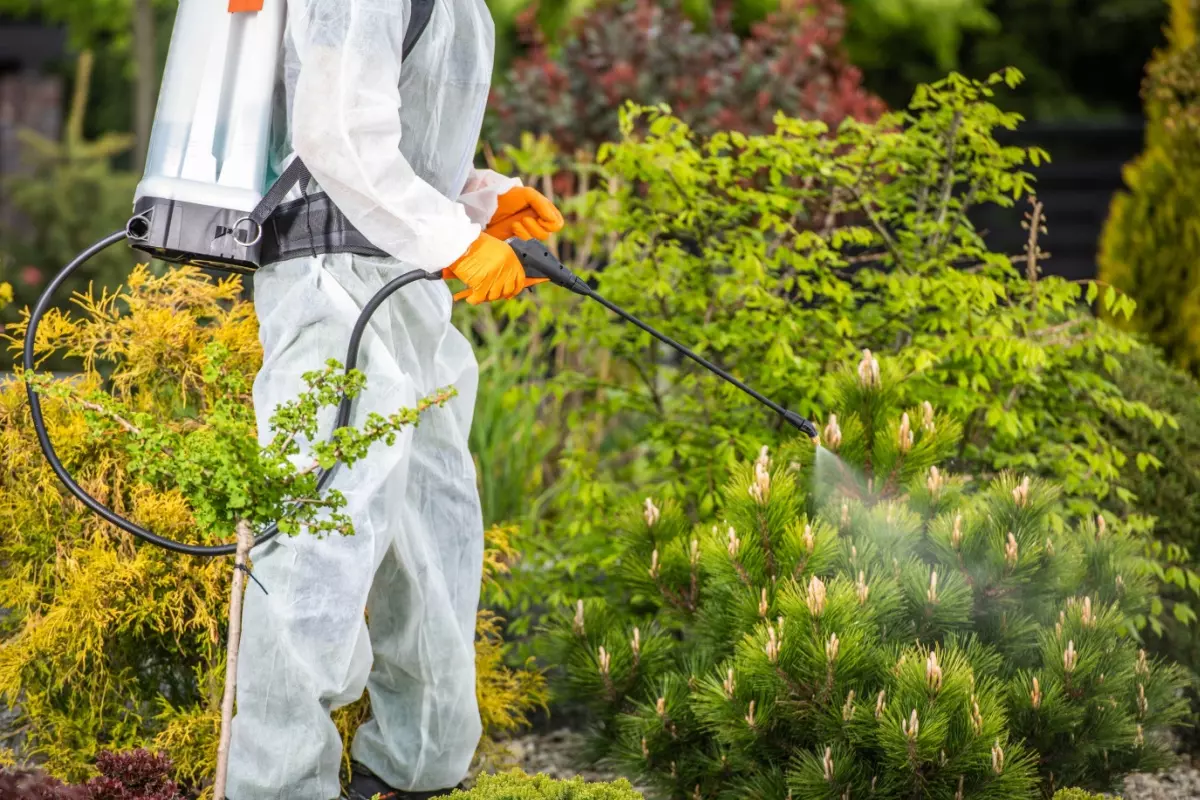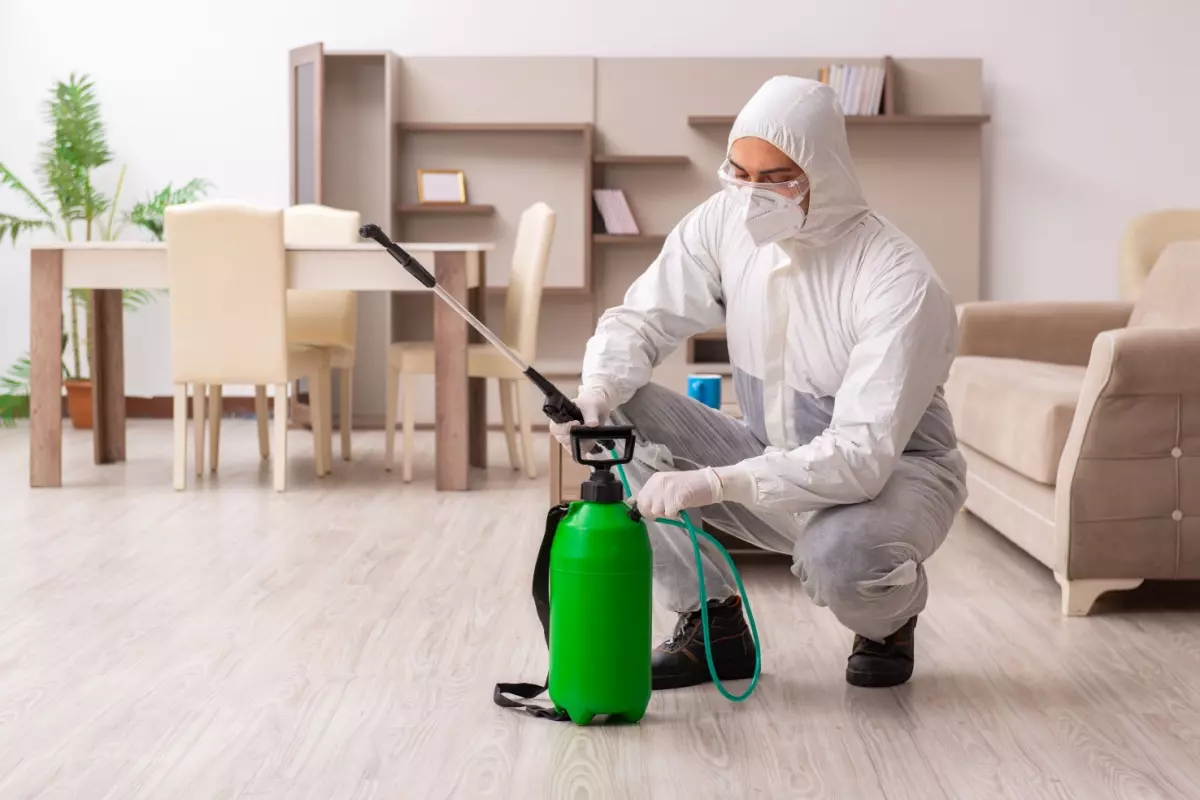For most people, bugs and rodents give them the heebie-jeebies. These creepy crawlies are considered pests that carry health risks for humans. While most are actually helpful to the environment and ecosystem, there are instances where they do pose problems.

And that’s where brave pest technicians step in to control infestations, remove pests, and ensure our overall health and safety. If you want to start your career as a pest control tech, we have all the information you need about starting salaries by specialization.
Or maybe you’re a seasoned veteran who owns your own pest control business, and you want to learn how to bump up your revenue. We have you covered, too. Below, we cover the average salary for a pest control technician, the factors influencing pay, and strategies to help you make more.
How Much Do Pest Control Technicians Make?
The pest control industry is quite large – bigger than most people think. Its value is projected to grow from $25 billion in 2022 to $42.5 billion by 2032.
More specifically, the U.S. market is also quite lucrative. In the states, the average total revenue for the pest control industry is around $17 billion. Clearly, pest control businesses and technicians are booming. But how does it affect the average pest control tech salary?
Annual Salary for Pest Control Technicians
Across all states and experience levels, the average pest control technician income is $45,153 annually or $21.70 hourly. However, based on your experience, the pest control salary can range quite dramatically.
For an entry-level technician with zero to two years of experience, the average pest control salary is around $39,957 annually or $16.06 hourly. The mid-level pest technician salary hovers closer to $45,688 annually and $18.37 hourly. These individuals typically have between three and five years of experience.
For senior-level positions with over five years of experience and multiple certifications, the average pest control technician salary is closer to $57,419 annually or $23.08 hourly.
Ultimately, the average salary of a pest control technician will depend on various factors. The primary factor influencing the amount you can expect to make is your experience level. However, other factors, which we will cover later on, can boost your average income.
Pest Control Technician Salaries by Specialization
While the terms pest control technician and specialist are used interchangeably, there are specific distinctions between the two. A pest control specialist typically has more experience, certifications, and understanding of pest biology, behavior, and advanced treatment techniques.

Given that pest control specialists require more extensive training and certifications, they often secure a higher salary.
Types of Specializations
If you’re looking to up your game and increase your earning potential, here are some of the top pest control specialties you can pursue:
Termite Control
These specialists inspect, identify, prevent, and treat termite infestations in commercial and residential properties. To pursue a termite specialization, you’ll need several years of training and experience, specifically with termites. You’ll also need an Associate Certified Entomologist (ACE) certification. A termite technician’s salary can reach up to $60,000 annually.
Wildlife Control
As a wildlife specialist, you’ll inspect, capture, and remove wild animals from residential and commercial areas to avoid conflicts with humans. These specialists also work on preventative measures to reduce the recurrence of wildlife threatening humans. You’ll need several years of experience in wildlife management, especially trapping and removing wild animals.
Wildlife specialists also need state licensing to operate legally, as well as certifications like the Certified Wildlife Control Professional (CWCP). On average, a wildlife specialist can expect to earn up to $50,000 per year.
Rodent Control
Similar to the other specialties above, a rodent technician focuses on inspecting, identifying, preventing, and treating mice, rats, squirrels, and other rodents. You’ll need several years of experience alongside state licensing.
Certifications from the National Pest Management Association (NPMA) may also be required. A pest exterminator’s salary reaches up to $50,000 per year.
Agricultural Pest Control
These specialists focus on inspecting, treating, and preventing pest infestations in crops, fields, and livestock. It requires an in-depth understanding and experience of local biology and ecology. You will need to be licensed by the state to pursue their specialization.
Agricultural pest control technicians also require the Certified Crop Advisor (CRA) and Certified Pesticide Applicator certifications. You can expect to earn up to $70,000 annually in this role.
Fumigation
Specialists in this area use gaseous pesticides known as fumigants to eliminate pests in residential and commercial properties. They work to eliminate termites, bed bugs, beetles, and other hazardous insects. For this specialization, you’ll need several years of experience working with these types of pests, as well as applying pesticides.
Since you’ll be working with chemicals, you’ll need to be licensed by the state. Fumigation specialists also need a Certified Applicator or Technician certification. You can expect to make up to $60,000 annually working with this specialty.
Factors Influencing Pest Control Technician Salaries
We mentioned earlier that experience is the most important factor that influences the salary of a pest control technician. However, there are several others that can affect how much you make.

Here are the top factors influencing pest control technician salaries:
Experience
Of course, the more experience you have, the more you could make as a pest control technician. Experience doesn’t just mean the number of years you have been working. It also includes experience with different types of pests, prevention technicians, specializations, and treatment methods.
Here’s how experience can improve your earning potential:
- Technicians with three to five years of experience earn, on average, 20% to 30% more than entry-level technicians
- Six to 10 years will boost your earnings by another 50% to 70%
- For over 10 years, you could be making 80% to 120% more
Education
Typically, pest control technicians only need a high school diploma or GED to get started. However, getting an Associate’s or Bachelor’s degree in entomology, biology, or environmental science can help you earn more. A formal education can also be a stepping stone into transitioning into a supervisory or managerial role that makes more money.
With an Associate’s degree, you could be making 20% to 30% more than an entry-level position, and with a Bachelor’s degree, this goes up to 40% to 60%. Managerial positions with a Bachelor’s degree make up to $80,000 a year.
Location
The area you operate in impacts your earning potential more than you might think. The cost of living, competition, regional pest problems, and gaps in services can all contribute to how much you can make as a pest technician.
On average, technicians in metropolitan areas make about 10% to 30% more than professionals in rural areas. Similarly, areas with a higher cost of living can net you 20% to 50% more. Finally, the availability of specialty services can increase your earning potential. If you are in an area with little to no competition, you’ll likely have a greater market share, contributing to higher revenue.
Certifications and Licenses
Finally, showcasing specialized pest control licenses and certifications can set you apart from the competition and boost your average salary. Here are some of the most useful ones:
- State-specific Licenses: To legally operate in your state, you will need to pass a licensing exam that includes pest identification, treatment, and safety regulations. In most cases, this license is mandatory, but in optional states, it can net you 5% to 15% more.
- Certified Pesticide Applicator (CPA): This certification demonstrates that you are qualified and skilled at handling restricted-use pesticides and chemicals. With this certification, you can make an additional 10% to 20%.
- Integrated Pest Management (IPM) Certification: An IPM-certified technician uses environmentally friendly and sustainable pest management techniques. You can boost earnings by 10% to 20% with this certification.
- Termite Control Certification: This certification demonstrates your experience and specialized skill in treating and preventing termite infestations. Technicians with this certification can earn 10% to 25% more.
- Fumigation Certification: A pest tech who has a fumigation certification demonstrates their skill in handling gaseous pesticides. It demonstrates your dedication to safety and can boost earnings by 15% to 30%.
- Wildlife Control Certification: Technicians who prefer to work with wildlife can get this certification to demonstrate their expertise in handling rodents and birds. This certification can increase earnings by 10% to 20%.
- GreenPro Certification: This certification is offered by the National Pest Management Association (NPMA). Technicians with the certification demonstrate their ability to provide environmentally sustainable pest control services. You can make 5% to 15% more with a GreenPro certification.
Strategies for Increasing Your Pest Control Technician Salary
Of course, we’d all love to make more money.

Luckily, as a pest control technician, there are several strategies you can use to increase your salary:
- Get Certifications: Begin by exploring certifications that are relevant to the pest control industry. Several of the options mentioned in the previous section are great starting points. Determine what kinds of services are lacking in your area and pursue a certification in that specialty to demonstrate your expertise and competence. Showcasing your certification can demonstrate to potential clients that you have the necessary skills and experience, helping you earn more.
- Offer Financing: If you’re a business owner, a surefire way to increase your revenue is to secure more projects. However, homeowners often have a hard time committing to the large upfront costs of pest control services. But that doesn’t have to be a hurdle for your clients if you start offering them financing options. With pest control financing, your clients can pay for services over time in small increments, and you can get started as soon as they are approved. By offering a hassle-free way to pay, you make it easier for homeowners to commit to your services. This, in turn, increases the number of projects you take on and the revenue you generate.
- Pursue a Formal Education: As mentioned earlier, getting an Associate or Bachelor’s degree can also demonstrate your expertise and skill. It can set you apart from the competition and even position you to take on higher management positions. Investing in a formal education can help you earn more in the long run.
- Provide Specialty Services: Finally, explore the market in your area. What services are in high demand? Are there enough specialized pest control technicians offering these services? If not, this could be a great opportunity for you to get a certification in these specialty services and tap into an underserved market. Offering services that have high demand and low competition can be a great way to earn more.
Final Thoughts
Becoming a pest control specialist is a great opportunity to make a difference in the environment and the health and safety of individuals. There are numerous specialty services you can offer, as well as certifications you can get that can showcase your expertise and net you a higher salary.
FAQ
Do you still have questions about how you can earn more as a pest control technician? Here are some frequently asked questions and answers:
How Can I Leverage Seasonal Demand in the Pest Control Industry to Increase My Income?
If you’re a business owner, offer packages and promotions for seasonal services. This could include a percentage off for inspection and treatment services. If you’re an individual pest control technician, consider getting specialized certifications that can help you stay busy all year.
This might include expanding your skill set to include mosquito treatment and prevention during the summer. During off-peak seasons, you can also offer prevention services to help you stay busy.
What Are the Benefits of Joining a Professional Pest Control Association?
When you join a professional pest control association like the NPMA, you gain access to educational and certification resources, as well as networking opportunities. You can also enhance your credibility, helping you earn more.
What Are Some Advanced Treatment Methods That Can Help Boost My Earning Potential?
If you have experience or a certification in any of the following treatment methods, you can potentially earn a higher salary:
- Integrated Pest Management (IPM)
- Organic pest control
- Eco-friendly treatments
- Heat treatments
How Do I Start My Own Pest Control Business?
If you’re an experienced technician looking to start your own company, here are the steps to start your own pest control business:
- Research market and service demand in your area
- Ensure you have the necessary state licensing and specialized certifications
- Select your business structure and register your company
- Get pest control equipment and hire technicians
- Market your business
For a more in-depth guide, check out our full-length article on starting a pest control business.
How Can I Market My Pest Control Business?
Marketing your business is necessary to attract new clientele. Here are some of the top pest control business marketing strategies you can employ:
- Build a professional website and use search engine optimization
- Post educational and helpful blog posts, videos, and FAQs
- Use pay-per-click (PPC) advertising
- Engage with clients on social media
- Send marketing emails
- Have a referral program
- Offer pest control financing
What Are Some Recent Trends in the Pest Control Industry?
Recent pest control industry trends include the following:
- Eco-friendly and organic pest management methods
- Biological control and habitat manipulation to manage pest populations sustainably
- Smart pest control devices
What Tools and Equipment Do I Need to Succeed as a Pest Control Tech?
The most common pest control tools and equipment include the following:
- Sprayers and foggers
- Traps
- Bait stations
- Dust applicators
- UV light traps
- Protective equipment
- Inspection tools (flashlights, moisture meters, endoscopes, cameras, etc.)
- Ultrasonic repellers
- Heat treatment equipment

